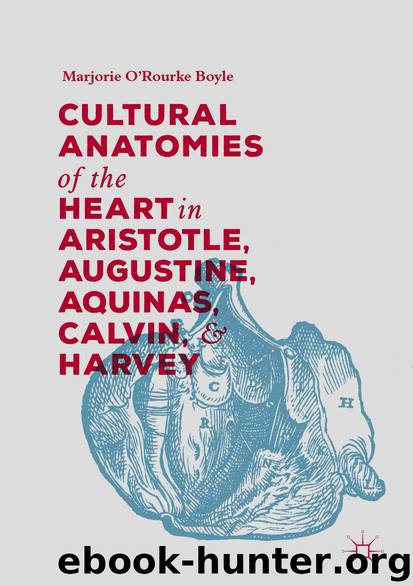Cultural Anatomies of the Heart in Aristotle, Augustine, Aquinas, Calvin, and Harvey by Marjorie O’Rourke Boyle

Author:Marjorie O’Rourke Boyle
Language: eng
Format: epub
ISBN: 9783319936536
Publisher: Springer International Publishing
Law
For Aquinas, the precepts of the natural law for the practical reason paralleled the first principles of demonstration for the speculative reason. Those precepts and those principles Aquinas declared self-evident.72 Rational self-evidence paralleled natural self-movement; both were intrinsic and teleological. Aquinas stated the first precept of the natural law as “good ought to be done and pursued, and evil ought to be avoided.”73 Complementary to his philosophical arguments for the natural law, his introduction and definition of it relied on the Glossa ordinaria, the standard biblical commentary. He partially quoted Romans 2:14, “When the nations, who do not have the law, naturally do those things that belong to the law.” He followed from the Glossa, “Although they do not have the written law, nevertheless they have the natural law, whereby anyone whoever perceives and is conscious of what is good and what is evil.”74 Aquinas argued his natural law eclectically. His other named sources were: Aristotle, Physica, Metaphysica, and Ethica nicomachea; Basil of Caesarea, In Genesin, creational homilies; John Damascene, De fide orthodoxa, a doctrinal summary; Augustine, De bono coniugium, an apologetic on marriage; Boethius, De hebdomadis, philosophical investigations on being; Justinian, Digestum, a codification of classical jurists; Gratian, Decretum, the basic compilation of canon law; Isidore of Seville, Etymologiae, an encyclopedic dictionary; Caesar, De bello gallico, political propaganda; and Augustine, Confessiones, personal epideictic rhetoric.75
Aquinas rephrased the first precept of the natural law without attribution from the same source that he indirectly had his psychology of the passions already treated in the same part of Summa theologiae.76 That source was the compilation of a bishop in the late fourth or early fifth century, Nemesius of Emesa’s Premnon physicon sive peri physeōs anthrōpou liber. The work was translated into medieval Latin twice. An incomplete version was Premnon physicon by Nicolo Alfano, a bishop of Salerno. That city was the site of the first medieval medical school,77 and the translation was preserved and consulted principally for its medical information.78 The complete work was translated as De natura hominis by Richard Burgundio of Pisa, a professor of law at Pisa and a notable translator of Aristotle and Galen. Aquinas used his translation, which misattributed the work to Gregory of Nyssa, not a church father but revered as a saint.79
De natura hominis was blessed by John Damascene’s unacknowledged citations of it in De fide orthodoxa, a major patristic summary of Christian doctrine.80 Aquinas’s own theology professor Albert the Great also cited Nemesius’s misattributed work.81 It was useful as the first Christian anthropology and particularly as the first integration of Aristotelian philosophy with Christian doctrine. Its importance has been reappraised as original and philosophical for its mediation of Aristotle to Plato on the body-soul relation. Nemesius argued from their Platonist instrumentality toward their Aristotelian unity,82 a position relevant for Aquinas’s doctrine of the soul as the form of the body.83 Aquinas used Nemesius’s book for both Christian doctrine and historical reference. He consulted it in the first part of the second part of Summa theologiae on human acts.
Download
This site does not store any files on its server. We only index and link to content provided by other sites. Please contact the content providers to delete copyright contents if any and email us, we'll remove relevant links or contents immediately.
4 3 2 1: A Novel by Paul Auster(12377)
The handmaid's tale by Margaret Atwood(7757)
Giovanni's Room by James Baldwin(7330)
Asking the Right Questions: A Guide to Critical Thinking by M. Neil Browne & Stuart M. Keeley(5762)
Big Magic: Creative Living Beyond Fear by Elizabeth Gilbert(5756)
Ego Is the Enemy by Ryan Holiday(5417)
The Body: A Guide for Occupants by Bill Bryson(5082)
On Writing A Memoir of the Craft by Stephen King(4936)
Ken Follett - World without end by Ken Follett(4723)
Adulting by Kelly Williams Brown(4567)
Bluets by Maggie Nelson(4548)
Eat That Frog! by Brian Tracy(4526)
Guilty Pleasures by Laurell K Hamilton(4440)
The Poetry of Pablo Neruda by Pablo Neruda(4098)
Alive: The Story of the Andes Survivors by Piers Paul Read(4023)
White Noise - A Novel by Don DeLillo(4006)
Fingerprints of the Gods by Graham Hancock(3996)
The Book of Joy by Dalai Lama(3976)
The Bookshop by Penelope Fitzgerald(3844)
